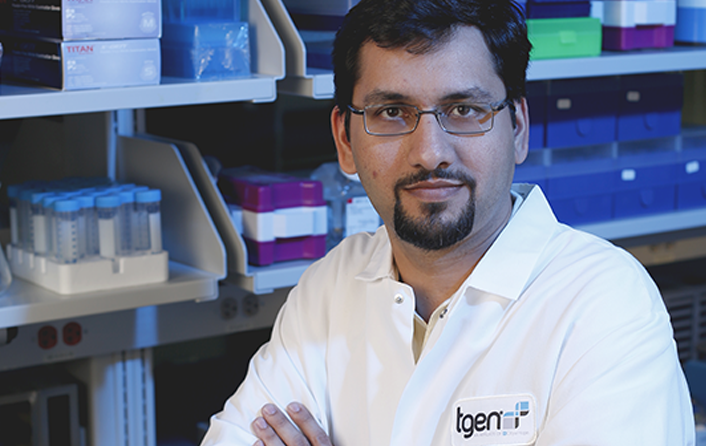
-
- Posted Tuesday October 15, 2019
TGen receives $2.1 million federal grant to refine cancer-detection blood tests
Liquid biopsy proves viable in laboratory analysis; new funding will help perfect this type of blood test in clinical trials for breast cancer patients
PHOENIX, Ariz. — Oct. 15, 2019 — On the heels of an earlier study showing how cancer can be precisely detected by a “liquid biopsy” blood test created by the Translational Genomics Research Institute (TGen), an affiliate of City of Hope, a new $2.1 million federal grant will now enable TGen and Mayo Clinic researchers to fine-tune the system in clinical trials.
The test called TARDIS — TARgeted DIgital Sequencing — is as much as 100 times more sensitive than other blood-based cancer monitoring tests as shown in early studies. It detects cancer by identifying and quantifying small fragments of cancer DNA circulating in the patient’s bloodstream, known as circulating tumor DNA (ctDNA). There is growing interest in the medical community in using the TARDIS test to see how well a patient with cancer responds to treatment.
Reliable performance of blood tests can be affected by sample handling. The $2.1 million, 5-year grant from the National Cancer Institute (NCI) will enable TGen and Mayo Clinic scientists to evaluate the impact of pre-analytical factors on liquid biopsies, such as blood collection tubes, DNA extraction methods, and long-term storage of ctDNA results and analysis.
“Circulating tumor DNA analysis can guide treatment of patients with localized cancers, and metastatic cancers that spread to other body organs,” said Muhammed Murtaza, M.B.B.S., Ph.D., Assistant Professor and Co-Director of TGen’s Center for Noninvasive Diagnostics. He holds a joint appointment on the Research Faculty at Mayo Clinic in Arizona.
Unlike traditional surgical biopsies, which only produce results from one place at one time, liquid biopsies use a simple blood draw, and so could safely be performed as often as needed to detect a patient’s disease status.
“However, pre-analytical factors such as blood collection tubes, processing protocols and storage conditions can affect the outcome of molecular tests,” said Dr. Murtaza, a senior author of a study — Personalized circulating tumor DNA analysis to detect residual disease after neoadjuvant therapy in breast cancer — published Aug. 7 in Science Translational Medicine, which suggest TARDIS can detect ctDNA in as low as 2 parts per 100,000 in patient blood.
“Besides looking at how blood processing affects the ctDNA results in patients with localized breast cancer, this new project allows us to investigate how well ctDNA analysis performs in even earlier stages of breast cancer than we have described previously,” Dr. Barbara A. Pockaj, M.D., a surgical oncologist who specializes in breast and melanoma cancer patients at Mayo Clinic in Arizona.
Dr. Pockaj, the Aug. 7 publication’s other senior author, is the Michael M. Eisenberg professor of surgery and the chair of the Breast Cancer Interest Group (BIG), a collaboration between researchers at Mayo Clinic, TGen and Arizona State University (ASU).
The ctDNA levels are much lower in patients with localized cancer than in those with metastatic cancer. Across different clinical and research sites, there can be many differences in sample handling, such as differences in blood collection and processing, and DNA extraction. For example, delays in processing a blood sample after collection can cause a dilution or degradation of ctDNA in blood samples. In early stage cancer patients, where ctDNA levels are already quite low, this could cause false-negative results.
To address this, TGen and Mayo Clinic will study 180 patients with early and locally advanced breast cancer to investigate three aspects of pre-analytical variation: DNA extraction methods, blood collection tubes and processing protocols, and long-term storage of plasma and extracted DNA.
About TGen, an affiliate of City of Hope
Translational Genomics Research Institute (TGen) is a Phoenix, Arizona-based non-profit organization dedicated to conducting groundbreaking research with life-changing results. TGen is affiliated with City of Hope, a world-renowned independent research and treatment center for cancer, diabetes and other life-threatening diseases: www.cityofhope.org. This precision medicine affiliation enables both institutes to complement each other in research and patient care, with City of Hope providing a significant clinical setting to advance scientific discoveries made by TGen. TGen is focused on helping patients with neurological disorders, cancer, diabetes and infectious diseases through cutting-edge translational research (the process of rapidly moving research toward patient benefit). TGen physicians and scientists work to unravel the genetic components of both common and complex rare diseases in adults and children. Working with collaborators in the scientific and medical communities worldwide, TGen makes a substantial contribution to help our patients through efficiency and effectiveness of the translational process. For more information, visit: www.tgen.org. Follow TGen on Facebook, LinkedIn and Twitter @TGen.
Media Contact:
Steve Yozwiak
TGen Senior Science Writer
602-343-8704
[email protected]


